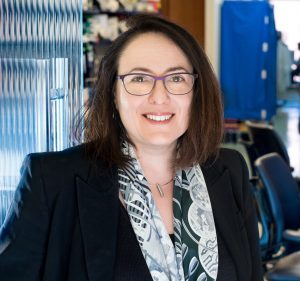Researcher Wins Barancik Prize for Study of Blood Factors’ Role in MS

Professor Katerina Akassoglou, a scientist at the University of California, San Francisco, is the winner of the 2018 Barancik Prize for Innovation in MS Research
Katerina Akassoglou, PhD, a leading neurology researcher at the Gladstone Institutes at the University of California, San Francisco (UCSF), won the 2018 Barancik Prize for Innovation in Multiple Sclerosis Research. Akassoglou will receive the award and deliver the Prize lecture at the Americas Committee for Treatment and Research in Multiple Sclerosis (ACTRIMS) Forum (Feb. 28- March 2) in Dallas, Texas.
The Barancik Prize for Innovation in Multiple Sclerosis Research seeks to distinguish and support a scientist or team of scientists for outstanding novelty and originality in scientific research relevant to multiple sclerosis (MS), particularly potential research on the treatment and cure for the disease.
This internationally recognized annual prize is made possible by the generosity of the Charles and Margery Barancik Foundation, and is given through the National Multiple Sclerosis Society.

Professor Katerina Akassoglou, a scientist at UCSF, is the winner of the 2018 Barancik Prize for Innovation in MS Research. Photo credit: National MS Society
Ruptures in the vasculature in the blood-brain barrier allow the entry of blood proteins into the brain. Akassoglou and her team study how these blood molecules interact with brain cells and potentially change their functions.
The team found that some of these blood molecules could induce inflammation and the formation of edema (swelling) as well as neuronal damage in a variety of neurological diseases, including MS and Alzheimer’s disease, as well as stroke and spinal cord injury.
In a series of experiments, Akassoglou’s team first showed that deposits in MS lesions of one such molecule called fibrin, known for its role in blood clotting, can hamper the natural nervous system repair and activate microglia — immune cells in the brain — triggering inflammation and nerve damage.
As a proof of principle for developing experimental therapeutics, the team then used an antibody that inhibits fibrin, and found it decreased the activation of microglia and reduced subsequent damage to nerve fibers in mice.
Connect with other people and share tips on how to manage MS in our forums!
Akassoglou’s team is now developing experimental treatments designed to prevent fibrin from causing damage without affecting its role in blood clotting.
“I’m humbled and deeply honored to win the Barancik Prize and truly grateful to the committee for recognizing the innovation and translational potential of our work,” Akassoglou said in a press release.
“I study how leakage of blood damages the brain. Our findings shed new light on mechanisms of brain damage in multiple sclerosis and introduced novel imaging technologies to study the interactions between the brain, immune system, and the vasculature. Translating findings into treatments is a cornerstone of our research program, and we are committed to developing new therapies for multiple sclerosis,” she said.
Akassoglou is a co-founder of the biotech company MedaRed, which recently received research funding from the National MS Society, through its Fast Forward program, to develop an antibody targeting fibrin in humans. Targeting fibrin has the potential to protect the nervous system in both early and late phases of MS.
“While others dismissed the idea that blood factors could be involved in the nervous system damage in multiple sclerosis, Dr. Akassoglou saw this as an important clue and has relentlessly pursued the idea and is now using this knowledge to translate her discoveries into possible therapies for multiple sclerosis,” said Bruce Bebo, PhD, executive vice president at the National MS Society. “Her tireless pursuit of a fundamental question in multiple sclerosis and the tenacity to translate this knowledge into potential therapies is why she is being recognized with this year’s Barancik Prize.”






